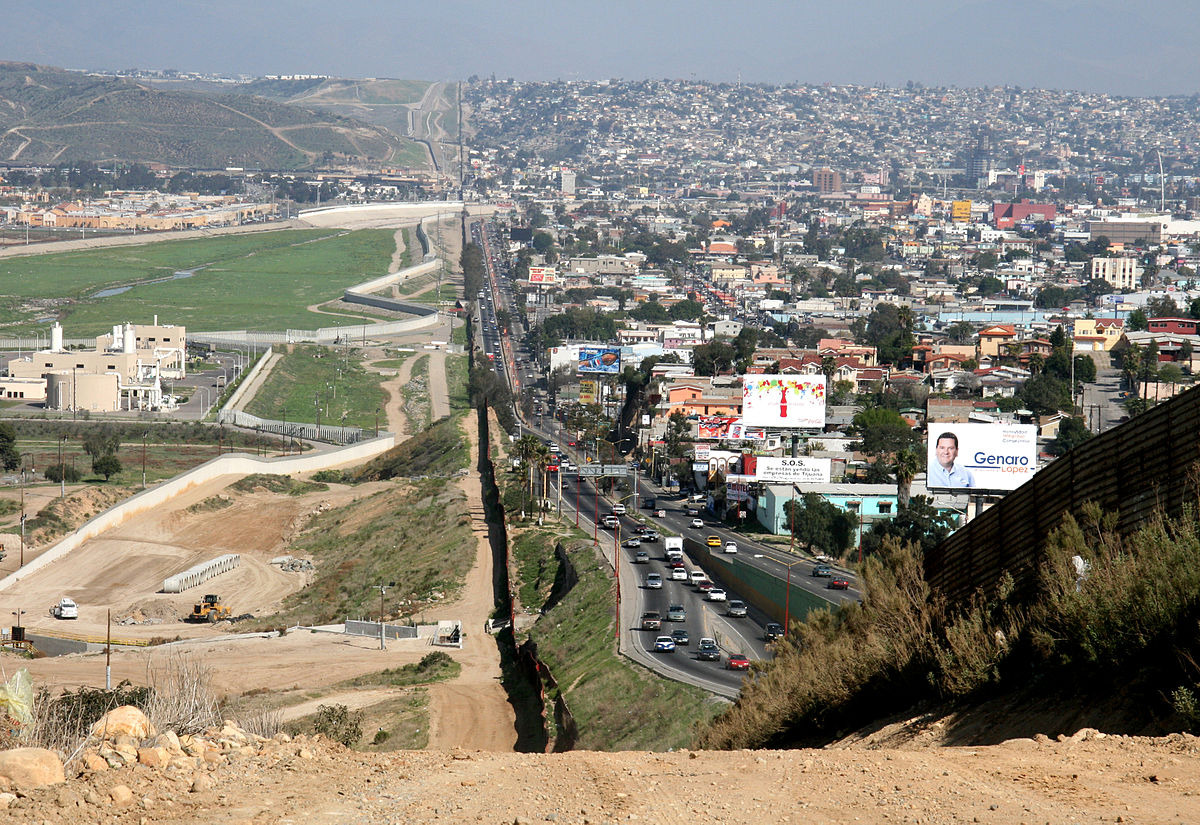Business and Economy
Deported Mexicans get new life in booming call centres that cater to American consumers

Border fence between Tijuana (right) and San Diego’s border patrol offices (left). Photo by Gordon Hyde / ngb.army.mil / Wikimedia Commons.
TIJUANA, Mexico—Henry Monterroso is a foreigner in his own country. Raised in California from the age of 5, he was deported to Mexico in 2011 and found himself in a land he barely knew.
But the 34-year-old Tijuana native feels right at home as soon as gets to work at Call Center Services International, where workers are greeted in English. Monterroso supervises five employees amid rows of small cubicles who spend eight hours a day dialing numbers across the United States to collect on credit card bills and other debts.
He is among thousands of deported Mexicans who are finding refuge in call centres in Tijuana and other border cities. In perfect English—some hardly speak Spanish—they converse with American consumers who buy gadgets, have questions about warrantees or complain about overdue deliveries.
At Monterroso’s office in one of Tijuana’s tallest buildings, managers bring meals from Taco Bell in nearby San Diego to reward employees because the fast-food chain has no outlets in Mexico. Workers are off for the Fourth of July and Thanksgiving but labour on Mexican holidays.
“The end of your shift comes at 6 and you get hit by reality out there: You’re not in the U.S.,” Monterroso said above the din of buzzing phones. “While you’re here, you still get a sense that you’re back home, which I like very much.”
Many workers spent nearly all their lives in the U.S. and still have family there, which is a major selling point for Mexico over English-language industry leaders like India and the Philippines. They can chat comfortably about the U.S. housing market and Super Bowl contenders. They know slang.
Still, the sudden change is a shock. Monterroso’s weekly pay of less than $300 is a humbling drop from the $2,400 he made in San Diego real estate at the peak of the U.S. housing boom in the mid-2000s. And back in Mexico, the deportees are often ostracized for off-kilter Spanish or seen as outsiders.
“It can’t get any worse for them,” said Jorge Oros, co-founder and chief operating officer of Call Center Services International. “They were deported from a country where they were for so many years and now they’re stuck here in a country where they’ve never been before. When you’re offering them a job and an opportunity, they become the most loyal employees you can have.”
By the end of the year, Mexico’s outsourced call centres will have more than 85,000 workstations, which may be staffed two or three shifts a day, while there are nearly 490,000 in India and 250,000 in the Philippines, according to Frost & Sullivan. The industry consultant estimates Mexico will surpass 110,000 workstations in 2020, fueled partly by a large pool of bilingual workers and proximity to the U.S.
Baja California state, which includes Tijuana, has about 35 call centres that employ nearly 10,000 people. An estimated 45 per cent are deportees, said Oros, who leads a local industry group. Callers typically start below $150 a week, more than twice what they would likely make on a graveyard shift in one of the city’s assembly plants.
The industry has prospered in Mexican border cities as deportations spiked under U.S. President Barack Obama. The Mexican government says there were 332,865 deportations from the U.S. last year and more than 1.8 million the previous four years.
At Call Center Services International, job applicants read English to voice-recognition software that flags anyone with a strong accent. The company conducted orientation for new hires in Spanish when it was founded but soon discovered that employees had an easier time following in English.
Firstkontact Center, where about 200 of nearly 500 employees were deported, opened a second building this year in an industrial area to more than double its capacity. More than 100 people in a warehouse-like room sell transmissions and brakes for U.S. Auto Parts Network Inc.
“How ya doin’ today?” one worker says to a customer in Crescent, Oklahoma, who wants suspension plugs for a 1986 Jaguar. “Not too good on gas, right?”
At its original location, near Tijuana’s trendy restaurants and shops, Firstkontact scrapped plans to convert a garage into an employee dining hall and erected more cubicles to handle calls from Americans who buy marine navigation devices.
“What’s goin’ on here?” 29-year-old Jonathan Arce asks a fisherman from Cecil, Wisconsin, in a booming voice.
“You take care of yourself,” he says before hanging up with another customer in Columbia, Kentucky.
Arce is an example of how the centres often give a fresh start to people with checkered histories. Many came to U.S. immigration officials after getting drunk behind the wheel, peddling drugs or committing another crime. Some wear tattoos they got while in U.S. street gangs.
“We have employees who, unfortunately, fell in with the wrong crowds and pursued lives of crime but, oddly enough, many of them are very loyal,” said Alvaro Bello, Firstkontact’s marketing director, who co-founded the company in 2008. “The majority of them have learned that shortcuts are not good.”
Arce came to the U.S. when he was 6 months old, was hooked on methamphetamine and marijuana as a teenager, and was in and out of jail for stealing cars in Merced, California. He enrolled in rehab after being deported to Tijuana in 2001, quit crime and gangs, and joined Firstkontact about three years ago after a stint as a dishwasher.
Arce, whose button-down shirts partly cover a California gang tattoo on the left side of his neck, makes $150 a week, enough to cover rent for a simple one-bedroom apartment that he shares with his wife and their 1-year-old son. He bought a 1994 Toyota Camry with a shattered windshield for $900.
The Acapulco native, who has a trim frame and quick smile, spends his spare time at an evangelical Christian church in the hardscrabble neighbourhood where he lives. He shares his story with deportees who show up and advises them on getting settled.
“If you’re deported, more than likely you’re going to get a job at a call centre,” he said. “The wages ain’t much, but it’s good enough for where we’re at right now. You can’t compare it to the United States.”
Many workers have battled depression and culture shock. They complain about being harassed by police for not having Mexican identification documents, sometimes landing in jail.
“When you’re first deported, you’re not coming down with an open mind,” said Antonio Rivera, 37, a Tijuana native who went to the U.S. as a baby, was expelled to Mexico in 2001 and now supervises 13 agents selling auto parts at Firstkontact. “You’re coming down here with an attitude, ‘Oh, I don’t deserve this.’ With a negative attitude, you don’t see things the way you’re supposed to—that they’re giving you a new chance.”





















